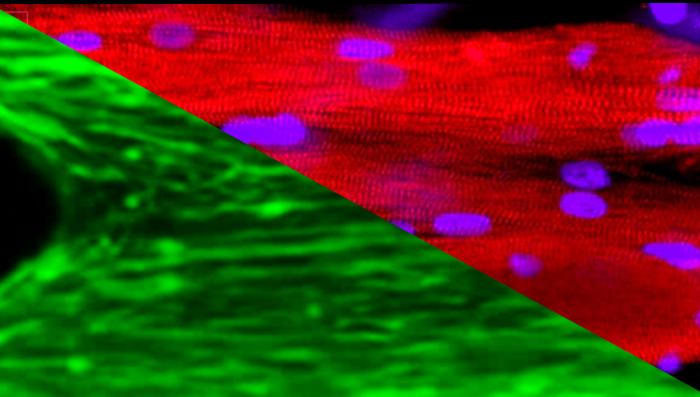In a groundbreaking study published in Stem Cell Reports, groundbreaking advancements in understanding muscle degeneration have emerged from research conducted by a team led by Siobhan Malany and Maddalena Parafati at the University of Florida. The work, which harnesses the distinct conditions of microgravity experienced in space, highlights the pressing issue of sarcopenia—a condition characterized by the loss of muscle mass and strength that predominantly affects the elderly. Sarcopenia is often a precursor to significant health complications, including a heightened risk of falls, disability, and ultimately, increased mortality rates among individuals over the age of 80.
According to current estimates, nearly half of individuals in this age group are affected by sarcopenia. As modern medicine struggles with effective treatments beyond lifestyle and diet modifications, the research conducted aboard the International Space Station (ISS) offers a novel opportunity for exploration. This microgravity environment has been identified as a unique model for studying muscle atrophy, providing researchers with a limited timeframe in which to observe changes that would typically develop over decades on Earth.
The study commenced with the construction of skeletal muscle microtissues created from biopsies of healthy donors of varying ages. By launching these engineered tissues aboard SpaceX’s CRS-25 mission, the researchers were able to observe the physiological and biochemical alterations that occurred as a result of the two-week spaceflight. Understanding the effects of microgravity on these muscle tissues could be pivotal in the race to find effective intervention strategies for age-related muscular degeneration.
Upon examination, the researchers discovered alarming trends in the strength and viability of muscle cells. Microtissues derived from active, young donors exhibited nearly double the contraction strength compared to those taken from older, sedentary individuals when tested on Earth. However, after only a short duration in space, the young muscle tissues began to experience a significant decline in strength, drawing dangerously close to the performance metrics of their older counterparts. This rapid loss illustrates how quickly microgravity can mimic the aging process.
Furthermore, the study noted a correlated decline in muscle protein content, further solidifying the notion that prolonged absence of gravity precipitates premature muscular degeneration. Alterations in gene expression were particularly pronounced among younger muscle tissues, indicating microgravity’s capacity to disrupt essential cellular processes tied to muscle health. This disruption highlights the urgency for exploring potential countermeasures to preserve muscular function during space missions and in the face of aging.
In the face of these challenges, the researchers incorporated electrical stimulation into their experimental design to simulate the effects of exercise. The remarkable finding, that such stimulation could partially mitigate the negative consequences on gene expression induced by microgravity, opens doors for developing innovative strategies to maintain muscle health not only in space but also on Earth.
“It is fascinating to see how the implementation of electrical pulses can effectively drive muscle contractions in real-time during space missions,” remarked Siobhan Malany. “Our findings support the potential of exercise-based interventions as a preventive measure against rapid losses in muscle strength that can occur in microgravity. From these insights, we can extract valuable lessons about maintaining muscle vitality during long-term space travel and potentially apply these principles to combat age-related muscular loss here at home.”
This investigation represents a significant step forward in modeling sarcopenia through microgravity, laying the groundwork for future studies aimed at understanding the underlying mechanisms to develop effective treatments. As mankind endeavors to push the boundaries of space exploration, this research provides a dual benefit—offering significant insights into the aging process that affects a substantial portion of the Earth’s population while also enhancing our ability to preserve health in the face of the challenges posed by long-duration space missions.
The study does not merely shed light on the pathophysiology of muscle degeneration; it also stimulates discussions surrounding translational research in stem cell advancements. The potential to bridge the gap between scientific discovery and clinical application is now more attainable than ever. Muscles weakened by microgravity could represent a valuable surrogate for understanding how muscle functions deteriorate in older adults.
In summary, the research culminates in an understanding that microgravity’s effect on muscle can serve as a powerful analogue for studying sarcopenia. It encourages further exploration into the nuances of muscle biology, with an eye towards developing potential therapies that could ameliorate declines due to aging or disuse, whether in space or on Earth. With the findings made available through Stem Cell Reports, the research community now has access to a wealth of information that could lead to pioneering advancements in the treatment of muscle degeneration.
The collaborative effort, which showcases the intersection of space exploration and biological research, exemplifies the innovative strategies needed to address longstanding health challenges. This work elegantly underscores the importance of interdisciplinary approaches in tackling complex biological problems, invigorating both the fields of space science and gerontology.
As we strive for greater distances in space exploration, the knowledge gained from these microgravity studies will illuminate paths not only for sustaining human health in space but also for enhancing the quality of life for aging populations on Earth.
By capturing the essence of how gravity—or the lack thereof—impacts our muscle tissue, this significant research indeed lays the groundwork for a proactive approach to muscle health in a rapidly evolving world.
Subject of Research: Effects of microgravity on skeletal muscle degeneration and gene expression
Article Title: Microgravity Accelerates Skeletal Muscle Degeneration: Functional and Transcriptomic Insights from an ISS Muscle Lab-on-Chip Model
News Publication Date: 26-Jun-2025
Web References: Cell, DOI
References: No specific references listed
Image Credits: Image credit: Maddalena Parafati (Malany`s Lab)
Keywords
Sarcopenia, muscle degeneration, microgravity, stem cell research, space flight, exercise simulation, gene expression, aging, ISS, muscle strength.




